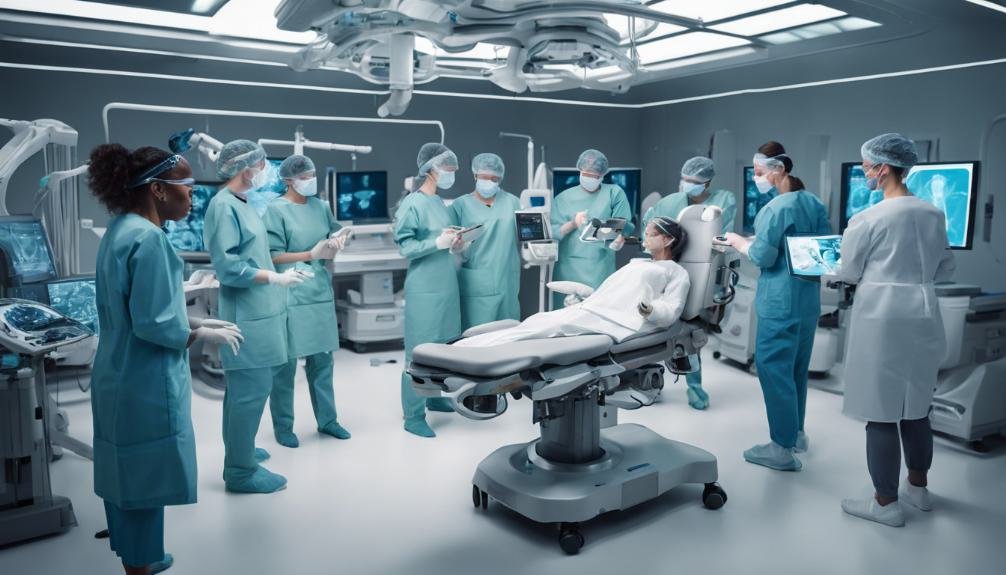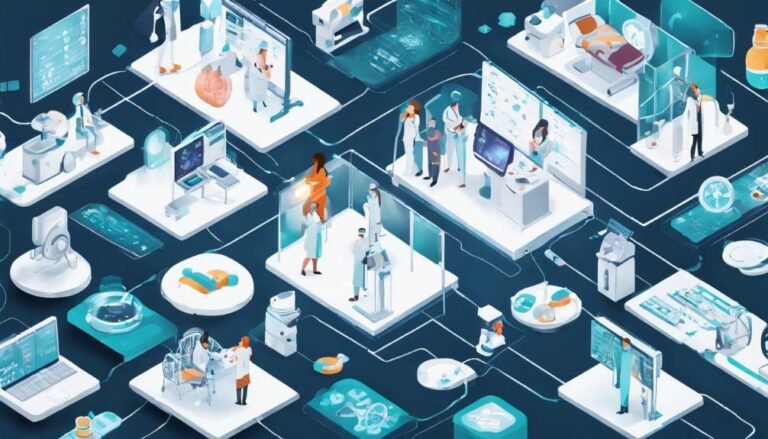AI for Medical Training
Have you ever considered how AI is revolutionizing medical training? Imagine being able to practice complex surgical procedures on virtual patients or receiving personalized feedback tailored to your learning needs. With AI-powered tools, healthcare professionals can enhance their skills and knowledge in ways never thought possible. The integration of artificial intelligence into medical training offers a glimpse into a future where learning is dynamic, personalized, and effective.
Key Takeaways
- AI enhances medical training through virtual patient simulations for realistic scenarios.
- Personalized learning modules offer tailored study plans and adaptive feedback.
- Adaptive skills assessment identifies strengths and weaknesses to optimize learning strategies.
- Data-driven feedback mechanisms improve performance analytics for continuous growth.
- AI-powered clinical decision support focuses on accurate diagnoses and treatment recommendations.
Virtual Patient Simulations
Utilizing advanced AI technology, virtual patient simulations offer medical trainees realistic and interactive scenarios to enhance their clinical skills and decision-making abilities. Through simulation-based training, these virtual patient interactions provide immersive learning experiences that closely mimic real-life medical scenarios.
Medical scenario simulations within virtual patient simulations allow trainees to practice diagnosing illnesses, prescribing treatments, and making critical decisions in a controlled environment. These simulations enable learners to apply theoretical knowledge to practical situations, improving their ability to handle complex cases with confidence.
Personalized Learning Modules
Virtual patient simulations pave the way for personalized learning modules tailored to the individual needs and progress of medical trainees. By utilizing AI algorithms, these modules can create personalized study plans for each learner, offering adaptive learning experiences that cater to their unique learning pace and preferences.
Through virtual patient interactions, medical trainees can practice clinical decision-making in realistic scenarios, receiving personalized feedback based on their actions. This tailored approach allows trainees to focus on areas where they need improvement, enhancing their skills effectively.
The adaptive nature of these learning modules guarantees that medical trainees receive targeted educational content that aligns with their current knowledge and skill level. By analyzing performance data from virtual patient simulations, the AI can dynamically adjust the difficulty and focus of the learning materials, optimizing the learning experience for each individual.
This personalized approach not only increases engagement but also improves knowledge retention and overall competency in medical practice.
Adaptive Skills Assessment
AI algorithms dynamically evaluate your proficiency as a medical trainee through personalized assessments tailored to your learning progress and knowledge level. These adaptive assessment techniques enable the system to adjust the difficulty and focus of questions based on your performance, ensuring a customized learning experience.
By continuously analyzing your responses, the AI can identify your strengths and weaknesses, allowing for targeted skills improvement strategies. Through adaptive skills assessment, you benefit from a more efficient and effective training process. The system can pinpoint areas where you excel, providing reinforcement in those areas, while also highlighting areas that require further development.
This personalized approach not only optimizes your learning trajectory but also enhances retention and understanding of medical concepts.
Data-Driven Feedback Mechanisms
You need to understand the significance of performance analytics in medical training and how data-driven feedback mechanisms can drive continuous improvement strategies.
Performance Analytics Importance
Utilizing data-driven feedback mechanisms in medical training is essential for enhancing performance analytics and improving learning outcomes. By analyzing the data generated from training sessions, institutions can gain valuable insights into the strengths and weaknesses of individual learners, allowing for targeted interventions to enhance skill development and overall performance.
Performance analytics play an important role in understanding the efficacy of training programs, enabling educators to tailor their approaches to meet the specific needs of each student. Through detailed analysis of performance data, patterns emerge that highlight areas requiring improvement, facilitating a more personalized learning experience.
This data-driven approach not only benefits the individual learner but also contributes to the overall quality of medical education programs.
Continuous Improvement Strategies
Implementing data-driven feedback mechanisms is essential for driving continuous improvement strategies in medical training programs. By establishing feedback loops that provide real-time insights into skill mastery and competency assessments, medical educators can tailor their training programs to meet the evolving needs of learners.
Continuous improvement strategies rely on the analysis of data gathered from various sources, including virtual simulations, patient interactions, and performance evaluations. These feedback mechanisms enable trainers to identify areas where learners excel and pinpoint areas that require additional focus.
By leveraging this data, educators can create personalized learning paths that enhance individual competencies and overall program effectiveness.
Feedback loops not only facilitate the identification of strengths and weaknesses but also foster a culture of ongoing improvement within medical training environments. Through continuous feedback and analysis, educators can adapt curriculum content, teaching methodologies, and assessment tools to optimize learning outcomes and make certain that trainees are well-prepared to deliver high-quality patient care.
AI-Powered Clinical Decision Support
When it comes to AI-Powered Clinical Decision Support, the focus is on the accuracy of diagnoses and data-driven treatment recommendations.
AI systems can efficiently process vast amounts of medical data to provide insights that aid in making informed clinical decisions.
AI Accuracy in Diagnoses
Enhancing diagnostic accuracy through AI-powered clinical decision support systems has shown promising results in the medical field. Despite the diagnostic challenges that healthcare professionals face and the limitations of AI, significant strides have been made in improving accuracy through AI advancements.
AI has the potential to assist in overcoming diagnostic challenges by providing additional insights and reducing human errors. While AI may have limitations in complex cases requiring nuanced judgment, it excels in processing vast amounts of data quickly and efficiently. By leveraging machine learning algorithms, AI systems can continuously learn and adapt, leading to enhanced diagnostic accuracy over time.
Recent advancements in AI technology have enabled more sophisticated decision support systems that can analyze patient data, medical images, and clinical notes to aid in accurate diagnoses. These systems work in tandem with healthcare providers, offering valuable recommendations and insights to improve diagnostic precision and patient outcomes.
As AI continues to evolve, its role in enhancing diagnostic accuracy is becoming increasingly crucial in modern healthcare practices.
Data-Driven Treatment Recommendations
AI-powered clinical decision support systems utilize data-driven treatment recommendations to enhance diagnostic accuracy and improve patient outcomes in modern healthcare practices. By employing treatment algorithms based on vast amounts of patient data, these systems can provide healthcare professionals with valuable insights and suggestions for the most effective courses of action. Machine learning plays an essential role in analyzing data from diverse sources, including electronic health records and clinical trials, to develop precise and personalized treatment recommendations tailored to individual patients.
These AI-powered systems not only assist in identifying best treatment plans but also help in predicting potential outcomes based on historical data and real-time information. By leveraging the power of data-driven insights, healthcare providers can make more informed decisions that positively impact patient care and recovery.
Through continuous learning and adaptation, these systems contribute to advancing the field of medicine by enhancing treatment efficacy and ultimately improving patient outcomes across various medical conditions.
Interactive Case Studies
Engage in immersive learning experiences through interactive case studies designed to enhance your medical training with real-world scenarios. By participating in role-playing scenarios, you can explore complex patient cases, honing problem-based learning skills essential for medical practice.
These interactive case studies offer a platform for peer collaboration, allowing you to work alongside fellow trainees to develop diagnostic and treatment strategies.
In these virtual environments, you'll encounter diverse medical situations that require critical thinking and quick decision-making. By maneuvering through these scenarios, you can improve your understanding of team dynamics within healthcare settings.
Collaborating with peers fosters communication skills and promotes effective teamwork, mirroring the collaborative nature of medical practice.
Interactive case studies provide a safe space to make mistakes, learn from them, and refine your decision-making processes. Embrace these learning opportunities to strengthen your clinical reasoning abilities and enhance your overall medical training experience.
Real-time Performance Analytics
Utilize advanced algorithms to track and analyze your performance in real-time during medical training sessions. Real-time progress tracking allows for immediate insights into your strengths and areas for improvement. By leveraging performance metrics, you can receive personalized feedback tailored to your specific learning needs.
This real-time feedback loop enables adaptive learning strategies that adjust to your pace and competence level dynamically.
With real-time performance analytics, you can monitor key indicators of your proficiency as you engage with medical training scenarios. These analytics provide valuable data on your decision-making processes, diagnostic accuracy, and procedural skills. By continuously evaluating your performance metrics, you can identify patterns, trends, and areas requiring further attention.
The integration of real-time progress tracking and personalized feedback enhances the effectiveness of your training sessions. This data-driven approach empowers you to optimize your learning experience, focus on areas of development, and refine your skills efficiently.
Embrace the power of real-time performance analytics to elevate your medical training to new heights.
Virtual Reality Surgical Training
You can experience realistic surgical simulations through virtual reality technology, providing a unique opportunity for interactive, hands-on practice.
This immersive training method allows you to hone your skills in a controlled environment that closely mirrors real surgical procedures.
Realistic Surgical Simulations
Virtual reality surgical training programs provide a cutting-edge platform for medical professionals to hone their skills in a realistic and immersive simulated environment. These simulations go beyond basic technical skills by incorporating essential aspects such as surgical team dynamics and patient care simulations.
By immersing yourself in these realistic scenarios, you can enhance your ability to work effectively within a surgical team, understanding each member's role and how to communicate efficiently under pressure. Patient care simulations allow you to practice critical decision-making in various medical scenarios, preparing you to handle unexpected complications with composure and expertise.
Through these advanced simulations, you have the opportunity to refine your surgical techniques while also developing crucial skills in teamwork, communication, and patient-centered care. The realistic nature of these simulations provides a safe yet challenging environment to test your abilities and improve your overall performance in surgical settings.
Embracing virtual reality surgical training can elevate your proficiency and confidence, ultimately leading to better outcomes for both you and your patients.
Interactive Hands-On Practice
Enhancing surgical skills through interactive hands-on practice in virtual reality training programs offers a dynamic and immersive learning experience for medical professionals. Simulation practice within virtual reality environments allows for realistic scenarios to be recreated, providing a safe space for hands-on training. These interactive modules enable surgeons to practice procedures repeatedly, honing their techniques and decision-making skills without risks to live patients.
The virtual reality experience enhances the learning process by engaging multiple senses, fostering a deeper level of understanding and retention. By immersing yourself in these simulations, you can develop muscle memory and spatial awareness essential for surgical success.
The interactive nature of the training modules enables you to receive immediate feedback, allowing for real-time adjustments to your approach.
Incorporating virtual reality into medical training revolutionizes the way surgeons learn and prepare for complex procedures. The hands-on training offered through interactive modules in virtual reality environments equips you with the skills and confidence needed to excel in the operating room.
AI-Enhanced Diagnosis Training
Additionally, the integration of artificial intelligence (AI) in medical training programs is revolutionizing the way healthcare professionals are being prepared for enhanced diagnostic accuracy. AI-driven education is reshaping diagnosis training through advanced simulation techniques that provide personalized feedback to learners.
By leveraging AI algorithms, medical trainees can engage in realistic patient scenarios, allowing them to practice making accurate diagnoses in a controlled environment.
Simulation training powered by AI offers a dynamic learning experience that replicates real-world medical situations with precision. This hands-on approach enables healthcare professionals to hone their diagnostic skills in a risk-free setting, fostering confidence and competence in diagnosing a wide range of conditions.
In addition, the personalized feedback generated by AI systems helps learners identify areas for improvement, tailor their training to address specific weaknesses, and track their progress over time.
Gamified Learning Platforms
Interactive game-based platforms are transforming the landscape of medical education by engaging learners in immersive and dynamic learning experiences. Game design principles are leveraged to create engaging scenarios that challenge users to apply medical knowledge in simulated environments. These platforms not only enhance engagement but also contribute to improved learning outcomes and knowledge retention.
The gamified learning approach in medical training capitalizes on the inherent motivation individuals have towards competition and achievement. By incorporating elements like points, levels, and rewards, these platforms motivate learners to actively participate and progress through the curriculum. This gamified structure encourages repeat engagement, ultimately leading to better retention of information and skills.
Furthermore, the interactive nature of these platforms allows learners to practice decision-making in a risk-free setting, refining their clinical reasoning and problem-solving abilities. By providing immediate feedback and opportunities for reflection, gamified learning platforms offer a holistic approach to medical education that's both effective and enjoyable.
Conclusion
In a world where robots can perform surgery and AI can diagnose diseases better than humans, it seems ironic that the key to harnessing the potential of healthcare professionals lies in embracing artificial intelligence for medical training.
By leveraging the power of technology, we can guarantee that the human touch remains at the core of patient care, creating a harmonious blend of innovation and compassion in the evolving landscape of healthcare education.







